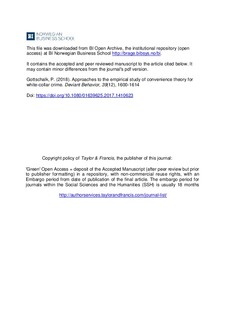Approaches to the empirical study of convenience theory for white-collar crime
Journal article, Peer reviewed
Accepted version
Permanent lenke
http://hdl.handle.net/11250/2562074Utgivelsesdato
2018Metadata
Vis full innførselSamlinger
- Publikasjoner fra CRIStin - BI [1015]
- Scientific articles [2181]
Sammendrag
Convenience theory suggests that members of the elite in society commit financial crime in their professional roles when alternative actions require too much effort. Convenience is a relative concept where white-collar crime is chosen over legitimate actions when there is a strong economical motive, ample organizational opportunities, and acceptance of deviant behavior. To study convenience theory, four investigations are presented in this article: statistical sample of white-collar criminals, autobiographies by white-collar criminals, internal investigations of white-collar crime, and student elicitation on white-collar crime. The strongest relationship within convenience theory seems to be the effect from willingness to commit crime based on deviant behavior on organizational opportunity to commit white-collar crime.
